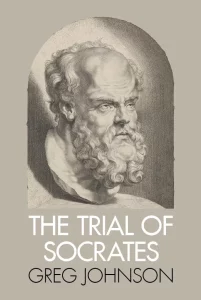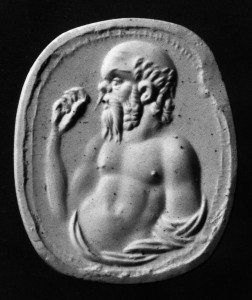Notes on Plato’s Gorgias, Part 6: Two Concepts of Freedom
Part 6 of 10 (Part 1 here, Part 2 here, Part 3 here, Part 4 here, Part 5 here)
Socrates the Pugilist
After Socrates outlines why he thinks that rhetoric is not an art but rather merely a “knack” for pandering and corrupting, he apologizes for lapsing into speech-making, but he explains that it was necessary, because Polus was incapable of answering short questions. He also grants that it would be only fair for Polus to resort to speech-making if Socrates is unable to answer Polus’ short questions.
Socrates is being a bit patronizing and nasty with Polus. When Polus replies with the question, “Do you think that rhetoric is flattery?” Socrates responds, “No, I said a part of flattery. If at your age, Polus, you cannot remember, what will you do when you get older?” When Polus asks if rhetoricians are held in low esteem in cities as flatterers, Socrates does not take the question in good faith but instead badgers Polus, asking “Is that a question or the beginning of a speech?” Socrates is not merely trying to refute Polus’ positions, he is trying to impeach him as a man in the eyes of the audience and undermine his own self-confidence.
Why does Plato include such details? Why does he depict Socrates engaged in the lowest sort of rhetorical pugilism? Socrates is merely responding to Polus’ provocations in kind.
Polus interrupts. Polus impugns the sincerity of both Gorgias and Socrates. Polus filibusters. Polus asks rhetorical rather than real questions. Polus cites the authority of the people and grandstands to the audience. Polus at one point simply laughs at Socrates. Socrates is, of course, primarily concerned with the truth. But he is also committed to winning the argument by hook or by crook.
Plato repeatedly insists that philosophers are very different from sophists in their first principles and ultimate goals. But he also shows that, to the naïve observer, philosophers and sophists look pretty much the same in their techniques, which is why Socrates ended up being convicted as a teacher of tyrants and corrupter of the youth. Plato believes it was a case of mistaken identity. But he also shows that it is an easy mistake to make.
Socrates responds to Polus that rhetoricians are not held in high regard at all. Socrates surely knew that if one were to conduct a poll of the Athenian public, they would hold rhetoricians in high regard. So what is the meaning of his claim?
Socrates holds that neither Polus nor the public at large really respect rhetoricians. But they don’t know their own minds. In other words, Socrates is assuming a distinction between what we really believe and what we merely think we believe.
For Socrates, all of us always already how the truth about the most important things: what constitutes a good life, what it entails, and how to attain it. These are truths about human flourishing, and we are human.
The difference between Socrates and Polus is that Socrates knows what he knows, and Polus doesn’t fully know what he knows. Thus Socrates’ approach to Polus is first to find whatever moral truths he is aware of. Then, working from that foundation, he will lead Polus step by step into agreement with Socrates. But Polus will really be agreeing with himself.
This is not, however, a purely ad hominem approach, for although each man has a different, more-or-less inadequate grasp of moral truth, we all know the same truth.
Two Concepts of Freedom
Polus’ objection is quite natural. “Don’t rhetoricians have great power in cities?” The answer is clearly yes. So how could they enjoy great power, yet be held in low esteem? Socrates’ answer is: Just as the esteem rhetoricians are held in is merely apparent, so is the power they enjoy.
Socrates begins with the premise that “Power is a good to its possessor.” Polus agrees. From that premise, however, Socrates will argue that rhetoricians “have the least power of all the citizens.” Recall that in the Gorgias power is identified with freedom. Thus rhetoricians would have the least freedom as well. Polus is incredulous: “What! Are [rhetoricians] not like tyrants? They kill and rob and exile any one whom they please.”
After a bit more bullying and badgering, Socrates replies: “rhetoricians and tyrants have the least possible power in cites, as I was just now saying; for they do literally nothing that they want, but only what they think best.” This is not power, however, because, as Polus has already agreed, true power is good for its possessor. Thus when a fool does merely what he thinks is best, if he is mistaken about what is best, he does not have real power.

You can buy Greg Johnson’s The Trial of Socrates here.
Let’s explore Socrates’ distinction between “doing what we want” and “doing what we think best.” This distinction should be sharpened by contrasting “doing what we really want” to “doing what we think we want.” The main issue is truth versus falsehood, fact vs. fancy. We are not free if we pursue false goals.
So what do we really want? We want what is actually good for us.
Socrates divides things into three categories: goods, evils, and things that, in themselves, are neither good nor evil, but they can be used for both good and evil ends. Socrates offers “wisdom and health and wealth” as examples of goods, “their opposites evils.”[1]
Another helpful distinction is between intrinsic goods, which are things that we pursue as ends in themselves, and instrumental goods, which we would never pursue as ends in themselves but only as means to intrinsic goods. For instance, we pursue health as an end in itself. We take medicines and submit to surgeries not as intrinsic goods, but only as means to the end of health.
Socrates offers as a universal truth that “If a man does something for the sake of something else, he wills not that which he does, but that for the sake of which he does it.” If do something that is not good or bad in itself, we do so only as a means to something that is good. As Socrates puts it,
When we walk, we walk for the sake of the good, and under the idea that it is better to walk, and when we stand we stand equally for the sake of the good . . . When we kill a man, we kill him or exile him or despoil him of his goods, because, as we think, it will conduce to our good.
If, however, we do not think these acts are good, we will not do them. Polus accepts all this.
Then Socrates drives home his conclusion. If all action aims at what is really good for us, then real freedom and real power are best defined as getting what is really good for us. If, however, we don’t know what is good for us, then we don’t have real freedom or real power. Thus, if a tyrant or an orator kills a man, or seizes his property, or exiles him, “under the idea that the act is for his own interests when really not for his own interests,” then we can say that he did what he thought best. But he didn’t do what he really wanted. Therefore, he is neither powerful nor free, even though he seems that way to the naïve observer.
But isn’t everyone capable of making mistakes about what is best for him? Is there any reason to think, then, that tyrants and orators are worse off than other men? Yes. We can appreciate how by using the distinction between friendship and flattery.
In the Alcibiades I, Socrates points out that tyrants are surrounded by people who fear to tell them the truth, which allows them to ruin themselves, both physically and spiritually. For Socrates, friends tell us the truth, even painful truths, even truths we don’t want to hear. Flatterers, however, only tell us what we want to hear.
For tyrants and rhetoricians, however, flattery is the coin of the realm. They rise by flattering the public. They exploit the people’s vices rather than helping the people overcome them. Then, when tyrants and rhetoricians attain power, they bask in the flattery of their inferiors. Such men are far more likely to be ignorant of what is truly good for them than humble and honest men who surround themselves with frank and honest friends.
Thus, for all their power and freedom to do what they think they want, tyrants and orators are less likely to have the power and freedom to do what they really want.
The Gorgias is the origin of a debate in political philosophy that continues to the present day. It is the debate between advocates of positive vs. negative freedom or liberty, which is also a debate between paternalism and libertarianism. Defenders of positive freedom define freedom as Socrates does: getting what we really want, which is well-being. Defenders of negative freedom define freedom as being able to do what one thinks one wants, even if one is mistaken about what constitutes well-being.
The critique of negative liberty is that it allows people to choose forms of slavery under the guise of freedom: addictive habits, junk culture, junk food, ignorance, sloth, ugliness, obesity, degradation — all the forms of physical and spiritual flattery that Socrates outlines. If real freedom is getting what we really want, namely well-being, then negative liberty is not freedom. It is simply a form of slavery to our own lowest desires. We are miserable because we are free, in the libertarian sense of freedom.
Thus, if we were forced to lead healthier lives — if we were prevented from buying addictive drugs and unhealthy foods, if we were forced to exercise and diet, if we were barred from empty and degrading pastimes — we would actually be freer, because we would be more likely to attain well-being, which is what freedom truly aims at. Thus, as Jean-Jacques Rousseau put it most pointedly and paradoxically, we can be “forced to be free.”
Note
[1] Polus agrees, but in other contexts (for instance, Euthydemus, 280 c-d), Socrates would classify wealth not as a good, but as something that could be good or bad depending on its use.




